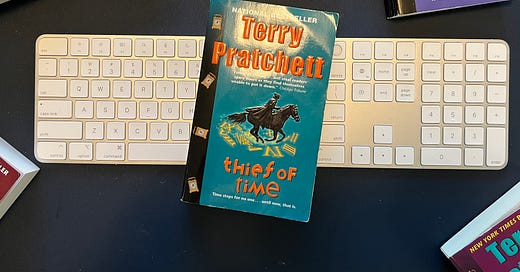It was supposed to be a normal vacation day.
Watch the sun rise over St. Petersburg, Florida. Sip coffee. Step into trunks. Grab book. Find my family. Hit the beach.
The only “plan” — if you could call it that — for the day was to plant my ugly toes in the sand and chew through a couple hundred pages of the novel I’d just grabbed off the nightstand.
But I made the mistake of glancing at my phone.
And I let out a gasp.
And I squeezed the book even harder, knowing its author had just died.
Celebrity deaths tend to pass right by me. The morning after Robin Williams’ suicide, I was gobbling up lukewarm eggs at a Hampton Inn with my then-manager.
She didn’t eat. “I can’t believe it!” It took me six minutes and three sausages to realize she was talking about the blue genie from Aladdin.
Terry Pratchett’s death in March of 2015 was different.
But then, Terry Pratchett is different.
Living without him was… and is… a little bit less wonderful.
(HE HAD TO GO. ALL DO.)
For those unaware, Terry Pratchett is a satirical fantasy author whose books sold 85 million copies worldwide, landing him in the rare pile of author millionaires. He piled up prestigious industry awards too, among them the Carnegie Medal and the Locus Award.
Most authors you’ve heard of — Stephen King, J.K. Rowling, Lev Grossman, George R. R. Martin, Brandon Sanderson, and so on — credit him as an influence.
People react to Terry Pratchett’s work the same way those discovering Picasso’s cubist paintings reacted.
“This is completely insane. But somehow… it works?”
And work it does.
The beauty of writing is this: We don’t have to lose authors we love.
Dickens’ gritty worlds are studied today. Jane Austen’s characters teach volumes. T.S. Eliot’s poetry is still imitated. And today, we learn from Terry, even though he left this world eight years and one month ago.
(HE CHEATS AT POKER.)
Here’s the opening paragraph of my favorite book he wrote: Thief of Time.
Let’s read and learn:
“According to the First Scroll of Wen the Eternally Surprised, Wen stepped out of the cave, where he had received enlightenment, and into the dawning light of the first day of the rest of his life. He stared at the rising sun for some time, because he had never seen it before.”
Technique 1 - Imagery
Terry talks about imagined worlds as if they were concrete.
The imagery (a scene or setting in book that illustrates something else) serves as an introduction for us. A character is literally emerging from darkness to light; we are emerging from the “darkness” of reality to the “light” of fantasy.
Terry does this sort of thing often to open his books:
Stars appearing from the black in Pyramids.
Gods setting chess boards in Interesting Times.
The sun rising in The Light Fantastic.
Sometimes he even breaks the fourth wall to launch us into the story. He asks, verbatim, “Where does it start?” in Lords and Ladies.
Technique 2 - The 14th Rule
It’s not just any scroll. It’s the FIRST scroll.
Technique 3 - Subversion
Terry flips genre tropes upside down like pancakes on Saturday morning. In a way, his books are upside-down versions of Lord of the Rings.
Normal fantasy name: “Wen the Wise”
Terry’s name: “Wen the Eternally Surprised.”
Technique 4 - Internal Cliffhanger
Finally, we finish with an internal cliffhanger. Although not blatant, Terry builds tension here by making us wonder WHY our character is staring at the direct sun, and WHAT the heck he is going to say.
4 techniques for you to practice… and we’re only 52 words in.
Miss you Terry.
Much love as always <3
-Todd B
(I WILL COME FOR YOU TOO ONE DAY, TODD.)




The style is so interesting. I'll have to add Pratchett to my summer reading list. Thanks!